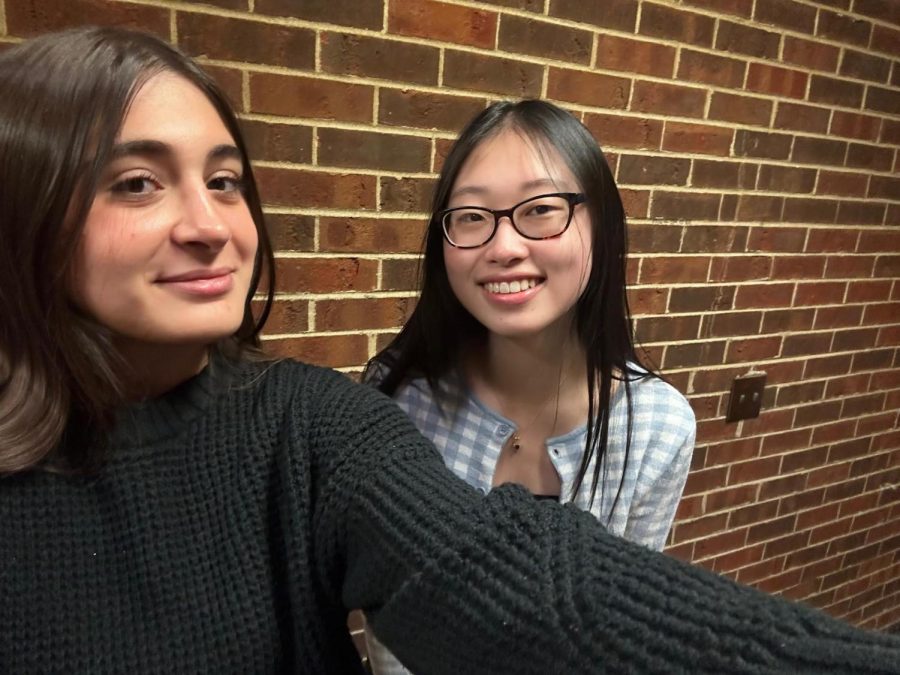Student duo takes on local election
Juniors take part in school board election process
In the few hours before her application was due, junior Julia Choi was on the fence about whether she should seek a seat on the New Trier School Board Caucus, a non-partisan group of 45 citizens, who interview, vet, and endorse candidates for the school board.
For two months, Choi would need to attend weekly, two-hour meetings but she knew that the experience would be “really cool,” so she decided to apply.
“I thought I might as well put my name out there, and see what happens,” said Choi.
She was selected as one of two students to serve on the caucus.
The caucus has emphasized equal representation, not only geographically, with each feeder district represented, but of stakeholders, such as adults–and students.
To fulfill its mission to endorse highly qualified candidates who should be elected to the school board, it was clear to the caucus that those who the decisions of the school board affect should have a voice. So, the caucus asked Student Council to send two representatives to serve on the caucus.
Last September, Student Council members received an application to serve on the caucus from Student Activities Coordinator Stacy Kolack. The students selected were collaborative and productive, and committed to service.
Junior Edyssa Elia, the other student representative, was happy to be selected, and have an opportunity to have her voice heard.
“As an individual who is a part of a minority group, I feel like it was really important that my voice be represented in this [caucus],” said Elia.
Choi was uncertain about what to expect at her first caucus meeting, but it helped to have Elia with her.
“I was a little bit nervous but it definitely helped [to have] Edyssa there because we were in it together,” said Choi.
As the caucus continued to meet, members were assigned to different committees. Elia and Choi both were on the interview committee, where they were able to work together to write and ask questions to applicants.
The interview process was conducted over a three-week period, which was “pretty intense,” said Elia. Each applicant was interviewed for 45 minutes and answered about 10 questions, each from a different member.
Board Vice President Jean Hahn, an applicant, has appeared before the Glencoe Caucus twice and the New Trier School Board Caucus in 2019. This was the first time that she saw students interviewing applicants.
“Student voice is at the center of everything we do at New Trier, so I was thrilled to see our students so actively engaged in the process of vetting candidates to serve on their school board,” said Hahn.
Throughout the interviews, Choi recognized what she valued in a school board member.
“I think if someone is confident, you can trust them more to handle the issues that you want to be handled,” said Choi.
An applicant could prepare by studying the school budget, and 2030 Strategic Plan, or reviewing school board minutes. The caucus also took note of applicants who had spoken with the administration.
Applicants who spoke with the administration “were able to answer questions in a much more detailed way,” said Choi.
And through her own preparation for the interviews, Choi came to understand how the school has her back, a sentiment that some students do not share.
“My friends, at least, felt that some [of their] needs were not being met.”
On the contrary, Choi told her friends, the administration is “working towards that.”
In 2019, the school board adopted the 2030 Strategic Plan, a blueprint for the next decade on how to make sure each student can live a meaningful, compassionate, and impactful life. This really impressed Choi.
“[I]t was really admirable how [the school board] set goals – and were actually doing things to get to those goals, and to have deadlines for those goals,” said Choi.
When Choi entered the caucus, she came in with no clue about how the school board election was handled but came out with hands-on experience, and a new appreciation for the administration.
“If there was more transparency between [the administration and the students], that the students, at least, would feel a little more heard,” said Choi.






































